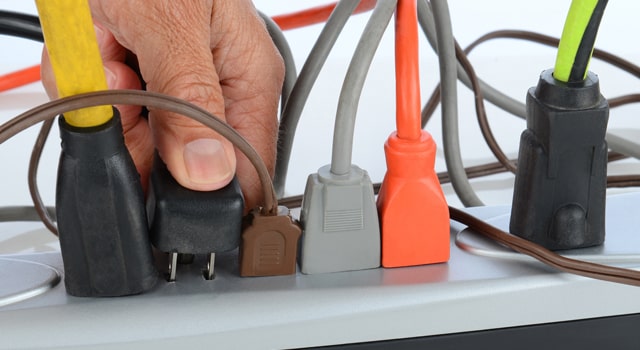Homeowners rely on electricity every day to power their appliances, heat and light their homes, and so much more. But electricity can also be dangerous. The home electrical safety tips below show you how to prevent electrical accidents and injuries.
Prevention Tips
It’s easy to forget how dangerous electricity can be. In fact, electrical issues are a leading cause of home fires every year. Home insurance policies cover fire damage, including fires caused by electrical issues.
Here’s what you can do as a homeowner to prevent electrical fires and other hazards.
Replace Damaged Electrical Cords
If you come across a loose, cracked or frayed electrical cord, replace it immediately. Worn-out cords pose a safety hazard, as the cord insulation must be intact to protect you from the electric current inside. If the damaged cord is for a small device, consider replacing the device. If it’s attached to a larger appliance, call the manufacturer for tips on how to replace it.
Don’t Overload Your Electrical Outlets
Each electrical circuit in your home is designed to handle only a specific amount of current before overloading. Therefore, if you plug too many electrical devices into the same outlet, you could overload the circuit or blow a fuse. To prevent this from happening, use several outlets instead of just one.
Also, if an electric switch or outlet in your home is hot to the touch, there could be an overloaded circuit, loose wiring or damaged plug. Call an electrician right away.
Use Extension Cords Properly
Extension cords are commonly misused around the home. Here are several safety tips to remember:
- Extension cords are designed for short-term usage only, not as a permanent solution. Long-term usage can eventually lead to a safety hazard. If you use them regularly, you should consider installing extra outlets.
- Like all cords, extension cords should never be run under carpeting, as the carpeting may cause the cord to overheat and catch fire.
- Make sure you use an extension cord with the proper wattage limit. Using an improper cord can cause overheating, electric shock and fire.
- Extension cords are rated for indoor or outdoor use. An indoor-rated cord won’t be able to handle the elements outside.
Keep Electrical Items Away From Water
Certain electrical devices, especially those in the bathroom and kitchen, are at risk of being exposed to water. For everyone’s safety, keep these items away from water as best you can. The electrical outlets in your bathroom and kitchen should have a ground fault circuit interrupter (GFCI) switch. If the device accidentally comes into contact with water, a GFCI switch will cut power to your blow dryer, electric shaver, coffee pot, blender, etc.
Use the Right Bulbs
You probably don’t think about electrical safety when you change a lightbulb, as it is such a common household task. However, there are some tips you should consider.
- Make sure you put in the right wattage bulb to handle the light.
- Don’t mix old incandescent bulbs with newer energy-efficient bulbs, as they use different amounts of power. Mismatched bulbs could cause overheating and a fire.
- Don’t change a bulb when the light fixture is still powered ON.
Schedule an Electrical Inspection
As a homeowner, it’s a good idea to get your electrical system checked periodically to make sure it’s operating properly. Many electricians recommend an inspection every three to five years for older homes and every 10 years for newer homes. During the inspection, the electrician typically will inspect your home’s switches, outlets and wiring.
Teach Your Kids About Home Electrical Safety
In addition to the safety tips detailed above, here are some common-sense rules for your kids:
- Keep things that can burn (e.g. socks, stuffed animals) away from space heaters and light bulbs.
- Never place electronic devices near liquids. Water and electricity don’t mix!
- Don’t stick your fingers or toys into an electrical outlet. Outlet plug covers are an easy and affordable way to child-proof your outlets.
Safety First: Call an Electrician
When it comes to an electrical issue in your home, you should resist the urge to tackle it yourself. Improperly installed wiring can cause dangerous shocks as well as fires. Don’t put yourself, your kids or your property at risk—let a licensed electrician deal with electrical issues. They have been trained in all home electrical safety measures.
NOW LET’S TALK ABOUT YOU
Do you have the right coverage? We’d love to chat with you about it. Call us at 844-235-3604 or speak to a local agent. If you’d rather not talk, you can get an online quote in just 5 seconds.

